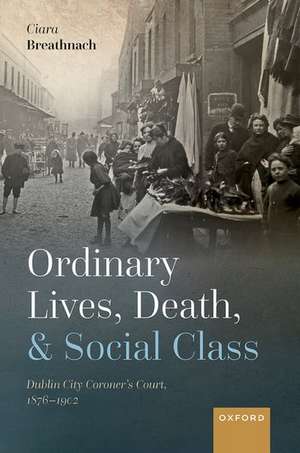Ordinary Lives, Death, and Social Class: Dublin City Coroner's Court, 1876-1902
Autor Ciara Breathnachen Limba Engleză Hardback – 23 iun 2022
Preț: 582.09 lei
Preț vechi: 698.20 lei
-17% Nou
Puncte Express: 873
Preț estimativ în valută:
111.40€ • 115.87$ • 91.96£
111.40€ • 115.87$ • 91.96£
Carte disponibilă
Livrare economică 13-19 martie
Preluare comenzi: 021 569.72.76
Specificații
ISBN-13: 9780198865780
ISBN-10: 0198865783
Pagini: 290
Ilustrații: 31 black and white figures/illustrations
Dimensiuni: 162 x 240 x 21 mm
Greutate: 0.59 kg
Editura: OUP OXFORD
Colecția OUP Oxford
Locul publicării:Oxford, United Kingdom
ISBN-10: 0198865783
Pagini: 290
Ilustrații: 31 black and white figures/illustrations
Dimensiuni: 162 x 240 x 21 mm
Greutate: 0.59 kg
Editura: OUP OXFORD
Colecția OUP Oxford
Locul publicării:Oxford, United Kingdom
Recenzii
An indispensable resource for this study are the jury riders attached to verdicts, which had no legal status yet made publicly available jurors' opinions and prejudices beyond the bare statement of facts. Such riders show how gender and class in particular influenced public perception of individual cases, and how blame was socially constructed and attributed, disadvantaging women above all. Using such materials innovatively, Breathnach delivers a fine grained and illuminating social history of poverty in Dublin.
Through its exploration of lives and deaths of "ordinary" Irish people, this book shows the remarkable potential of the seemingly mundane. Ciara Breathnach skillfully probes the records of the City of Dublin Coroner's Court to understand the enormous complexity of day-to-day life, including the influence and importance of place, the impact of medicine and changing conceptions of health, and the very tangible impact of gender, class, and power had on individual bodies, families, and communities. The result is a text that is deeply engaging and enlightening. Moreover, the methodology and approach to research should, and no doubt will, provide critical guidance and inspiration to scholars from a number of disciplines, promising to raise the visibility and potential of Irish Studies as a whole.
... a meticulous investigation of the events recorded in the inquests, taking the reader into the world of Dublin's ordinary population ... a most necessary addition to historical scholarship, including but not limited to social, legal and medical history. In exploring the sudden, accidental and violent deaths of those most vulnerable and undocumented in Dublin at the turn of the twentieth century, this book provides pivotal insight into the lives of the city's ordinary population inside and outside the home.
Ordinary Lives is a remarkable book that examines the medico-legal system of Dublin city coroners' inquests through the frameworks of blame, gender, and power. What Breathnach's skilful analysis exposes is not only the history of the Dublin City coroner's court, but also the marginalized lives that often evaded the surveillance of biopower. The methods and ethical approach to the subject demonstrate exemplary historical scholarship, but this study will also appeal to literary and cultural studies scholars because of its finely grained attention to Dublin life and attention to biopower. By writing these forgotten stories back into the historical narrative of Dublin, Ordinary Lives invests the quotidian deaths of this period with meaning and value.
Ordinary Lives is a remarkable book that examines the medico-legal system of Dublin city coroners' inquests through the frameworks of blame, gender, and power.
Through its exploration of lives and deaths of "ordinary" Irish people, this book shows the remarkable potential of the seemingly mundane. Ciara Breathnach skillfully probes the records of the City of Dublin Coroner's Court to understand the enormous complexity of day-to-day life, including the influence and importance of place, the impact of medicine and changing conceptions of health, and the very tangible impact of gender, class, and power had on individual bodies, families, and communities. The result is a text that is deeply engaging and enlightening. Moreover, the methodology and approach to research should, and no doubt will, provide critical guidance and inspiration to scholars from a number of disciplines, promising to raise the visibility and potential of Irish Studies as a whole.
... a meticulous investigation of the events recorded in the inquests, taking the reader into the world of Dublin's ordinary population ... a most necessary addition to historical scholarship, including but not limited to social, legal and medical history. In exploring the sudden, accidental and violent deaths of those most vulnerable and undocumented in Dublin at the turn of the twentieth century, this book provides pivotal insight into the lives of the city's ordinary population inside and outside the home.
Ordinary Lives is a remarkable book that examines the medico-legal system of Dublin city coroners' inquests through the frameworks of blame, gender, and power. What Breathnach's skilful analysis exposes is not only the history of the Dublin City coroner's court, but also the marginalized lives that often evaded the surveillance of biopower. The methods and ethical approach to the subject demonstrate exemplary historical scholarship, but this study will also appeal to literary and cultural studies scholars because of its finely grained attention to Dublin life and attention to biopower. By writing these forgotten stories back into the historical narrative of Dublin, Ordinary Lives invests the quotidian deaths of this period with meaning and value.
Ordinary Lives is a remarkable book that examines the medico-legal system of Dublin city coroners' inquests through the frameworks of blame, gender, and power.
Notă biografică
Ciara Breathnach is Associate Professor in History at the University of Limerick where she has worked since 2005. She is currently an Irish Research Council Laureate Awardee (2018-2022) and has published widely on Irish socio-economic, gender, cultural, and health history.
